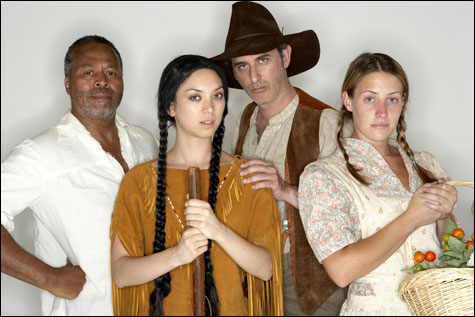
The Kentucky Cycle |
| The Kentucky Cycle | Zeitgeist Stage Company + Way Theater Artists | Boston Center for the Arts Plaza, 539 Tremont St, Boston | October 6–November 17 | $35; $60 both parts | 617.933.8600 |
In the absence of an incendiary subject like the AIDS epidemic, which inspired Angels in America, or the resources of the Royal Shakespeare Company, which brought Nicholas Nickleby to Broadway, what would induce a tiny fringe contingent like Zeitgeist Stage Company and Way Theater Artists to take on the six hours of Robert Schenkkan’s 1992 Pulitzer-winning spectacle, The Kentucky Cycle? Zeitgeist’s artistic director, David J. Miller, who is staging the Boston-area premiere of the historical extravaganza, admits that there’s “a fine line between chutzpah and madness. We balance there every day.”The Kentucky Cycle, which is being presented in two parts, follows the fortunes of three families over seven generations, 1775–1975. The first of the nine plays begins when Michael Rowan lays claim to Indian land and then kidnaps and rapes a Cherokee woman, Morning Star, to found his dynasty. The bloodline continues through Jesse Biggs, a Rowan family slave, and his descendants and the Talberts, who are connected to the Rowans by an 18th-century marriage — and a murder. Seen on Broadway in 1993, following its premiere in Seattle, the show packed the insights of Ken Burns’s Americana with the violent wallop of High Noon. “I’m hoping the epic quality of the show will attract audiences,” says Miller. “People either glaze over or say, ‘Oh my God, I have to see that.’ ”
Drawing on skills he learned at his day job as a vice-president at Putnam Investments, Miller created an Excel spread sheet to keep track of the 23 actors he chose to play 120 roles. More than 180 local thespians showed up at auditions for the non-Equity cast, which has been rehearsing nightly in the downstairs social hall of St. John the Baptist Greek Orthodox Church in the South End. To watch them run through a scene from the part of the cycle set in the 1920s, about a strike in the coal mines, is to follow dialogue mixed with choreographed fights and punctuated by folk songs accompanied on varied instruments.
Julie Levene, artistic director of Way Theater Artists and assistant director/dramaturg for The Kentucky Cycle, observes that the play “touches on the treatment of the Indians, the indentured servants, and the African slaves. It’s about the lust for land, but the deeper theme is the desire to be independent, the lord of your own domain.”
“The word I most use is ‘primal,’ especially in part one, the plays from 1775 to 1875,” adds Miller. “For me, it’s an American Greek tragedy. Sons kill their fathers; mothers get revenge on their children. I tell the actors, ‘If you didn’t go out and kill something or someone that day, you didn’t eat.’ ”
On the Web
The Kentucky Cycle: www.BostonTheatreScene.com | www.kentuckycycle.blogspot.com | www.kentuckygroup.blogspot.com